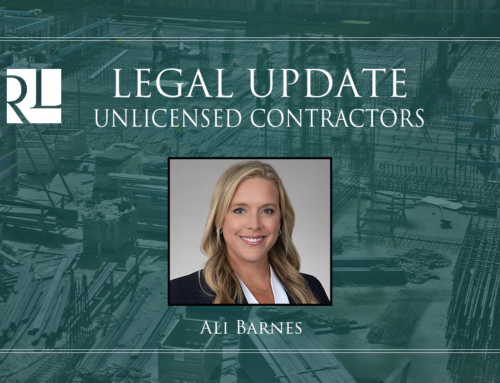Construction Industry Legislative Update
Several important laws affecting the construction industry were passed by the Louisiana legislature and signed into law by the governor during the 2018 Regular Session.
- CMAR Threshold – La. R.S. § 38:2225.2.4
The law governing the use of the Construction Manager At Risk (CMAR) project delivery method for public works was amended to allow public entities to award a contract to a CMAR for projects estimated to cost more than $5 million. Under the current law, the CMAR delivery method is only permitted when a project is estimated to cost more than $25 million. The new law also requires a public entity to deliver written notification at least 60 days in advance of a proposed CMAR project to the appropriate House and Senate committee for approval. Under the new law, a CMAR contractor is prohibited from bidding on a project if it is re-advertised and let out for bid when an owner and CMAR cannot reach agreement on the terms of a contract. The new law will become effective August 1, 2018.
- Amendments to Public Works Prompt Pay Act – La. R.S. § 38:2191
The statute governing timeliness of payment by public entities on public works was amended to include an additional penalty for an owner’s failure to timely pay a contractor. Under the current law, a public entity is liable for reasonable attorney fees if it (1) fails to make a progress payment within 45 days of receipt of a certified request for payment without reasonable cause; or (2) fails to make final payment within 45 days of formal final acceptance and receipt of a clear L&P certificate. Under the new law, a public entity will also be liable for interest at 0.5% accumulated daily, not to exceed 15%. The interest will be paid on a pro rata basis to the contractor and subcontractors based on the principal amount due each. The new law will become effective August 1, 2018.
- Regional Authority for Mississippi Bridge Development – La. R.S. § 48:771, et seq.
A new law was enacted that creates the Capitol Area Road and Bridge District as a political subdivision of the State for the purpose of financing road and bridge projects to alleviate traffic congestion in East Baton Rouge, Ascension, Livingston, Iberville, and West Baton Rouge Parishes. The primary goal of the new agency will be to find a way to finance a new bridge across the Mississippi River. The board will have the authority — subject to voter approval — to generate revenue for the new bridge in several ways, including the ability to implement tolls, impose parcel fees, levy ad valorem, property, or sales taxes, develop public-private partnerships, or apply for federal funding. The new law became effective May 25, 2018.
- Outcome-Based Performance Contracts – La. R.S. § 38:2320.1
A new law was enacted to allow political subdivisions to use the outcome-based contract alternative project delivery method to contract for integrated coastal protection projects estimated to cost less than $25 million. The statute defines “outcome-based performance contract” as a delivery method by which the owner contracts for results-based, specific agreed-upon outcomes, goals, or outputs, with payment made upon successful completion of the pre-agreed result, outcome, goal, output, or result. The new law applies to integrated coastal protection, which includes any projects, policies, or programs intended to provide hurricane protection or coastal conservation or restoration. An award of a project under the statute can only be made after issuance of an RFP and the competitive bid process set forth in the statute. The statute prohibits a challenge to the choice of a successful bidder except for fraud, bias for pecuniary or personal reasons, or arbitrary and capricious selection by the political subdivision. The bidding process outlined in the statute supersedes the Louisiana Public Bid Law. The new law became effective May 20, 2018.
- Unauthorized Entry and Criminal Damage – La. R.S. § 14:61
The crime of unauthorized entry of a critical infrastructure was amended to include any site where the construction or improvement of any facility or structure is occurring. In addition, the crime of criminal damage to a critical infrastructure was created, along with the crime of conspiracy to commit either offense. The new law will become effective August 1, 2018.
- Annual Permits for Ready-Mixed Concrete Trucks – La. R.S. § 32:387.20
A new section was added to the Louisiana Highway Regulatory Act that will require an annual permit to operate ready-mixed concrete trucks on state highways and frontage roads adjacent to federal interstate highways (not including federal interstate highways). The permit would authorize higher gross weights than previously allowed under the current law, which is set to expire on July 31. Fees for the annual permit range from $400 to $800 per vehicle. The new law will become effective August 1, 2018.
- Changes to Licensing Board for Contractors – La. R.S. § 37:2151, et seq.
The law governing the Louisiana State Licensing Board for Contractors (LSLBC) was amended to increase the number of board members from 15 to 19 and the quorum requirement was increased from 8 to 10 members. The amended statute also increases the number of members who must have experience as a licensed contractor in building or industrial construction from 4 to 6. The amended statute also mandates at least one member on the board from the NAACP. The new law will become effective August 1, 2018.
- Authority of State Fire Marshal – La. R.S. § 40:1730.39
The power of the State Fire Marshal was expanded to allow agreements with municipalities and parishes to allow the fire marshal to take into consideration “practical and unreasonable economic hardships” before applying the strict requirements of the Louisiana State Uniform Construction Code. Under the amended statute, the Fire Marshal may allow alternative materials, design, and methods of construction and equipment that comply with the International Building Code. The new law will become effective August 1, 2018.
- DOTD Transparency – La. R.S. § 48:94
A new law was enacted that requires each DOTD district office to publish weekly information online regarding the construction and maintenance work performed in each parish, including a description and location of the project or maintenance work performed. The new law will become effective August 1, 2018.



